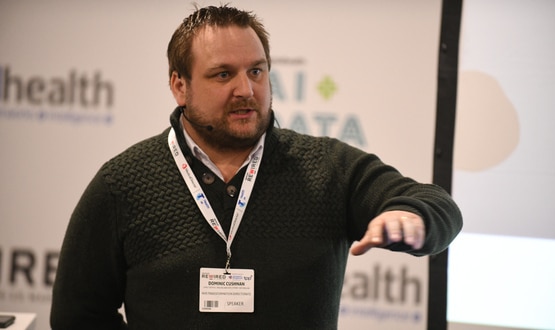AI regulatory framework and workforce training key priorities says Cushnan
- 14 March 2023

Clarifying the regulatory framework and embedding training of the health workforce are key to accelerating the use of artificial intelligence (AI) in the UK health system, speakers told a packed “Changing the conversation on AI” keynote session at Digital Health’s Rewired 2023.
Director of AI, imaging and deployment for the NHS Transformation Directorate Dominic Cushnan told the audience: “AI’s role is to augment and enhance, not replace human expertise.” More work is also needed to prove the medical and cost-effectiveness of AI technology.
It is expected to be most effective in the diagnostic space, he said, adding that there is a need to provider further clarity about the evidence base needed to raise clinicians’ comfort level with using the system, and about the commercial processes developers need to follow to sell to the health service.
“Most of the conversation to date has been on R&D,” Cushnan said, adding that moving to adoption and live use requires a new series of challenges, including training staff, speeding up collection of evidence and determining who is ultimately accountable for new technology.
A number of projects are helping to speed up the process of implementing AI use in the NHS, Cushnan explained, including the AI in Healthcare Awards, which is already trialling 86 projects across 99 hospitals in the UK, and workforce confidence efforts, which are building on Health Education England’s Topol Review to embed confidence in using technology among the health service workforce.
Other initiatives include the Multi-Agency Advisory Service (MAAS), a joint program between NICE, NHRA, CQC and HRA to offer support information and advice on regulation and evaluation pathways for AI and digital health technologies in health and social care.
MAAS is aimed at giving developers the assurance that their programs meet safety and quality measures, and adopters of technology the knowledge to adopt and deploy new technologies safely.
National clinical lead for AI and digital medical workforce at Health Education England (HEE), Hatim Abdulhussein, said that with medical knowledge doubling every 60 days, clinicians need “more actionable intelligence” and the health service should adopt only those tools that will help alleviate the clinical workload.
“It’s not about pie-in-the-sky, but about focusing on types of tools that are going to make our jobs easier,” he added.



